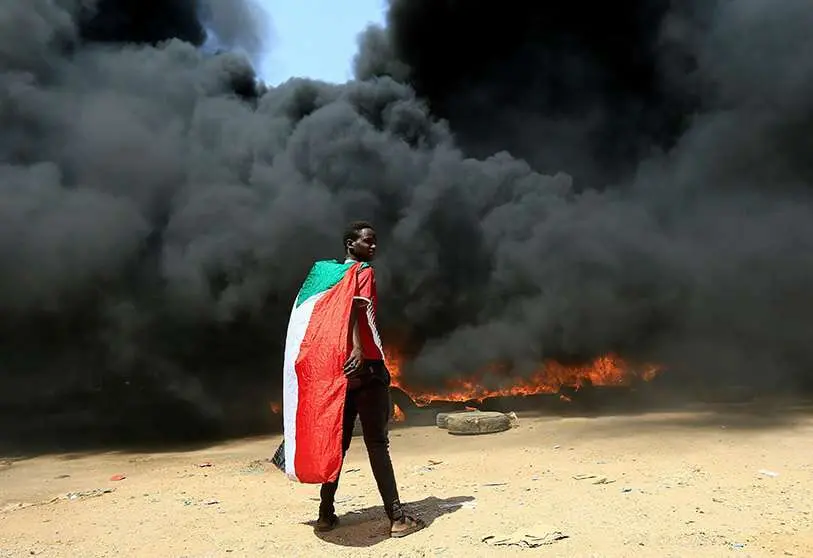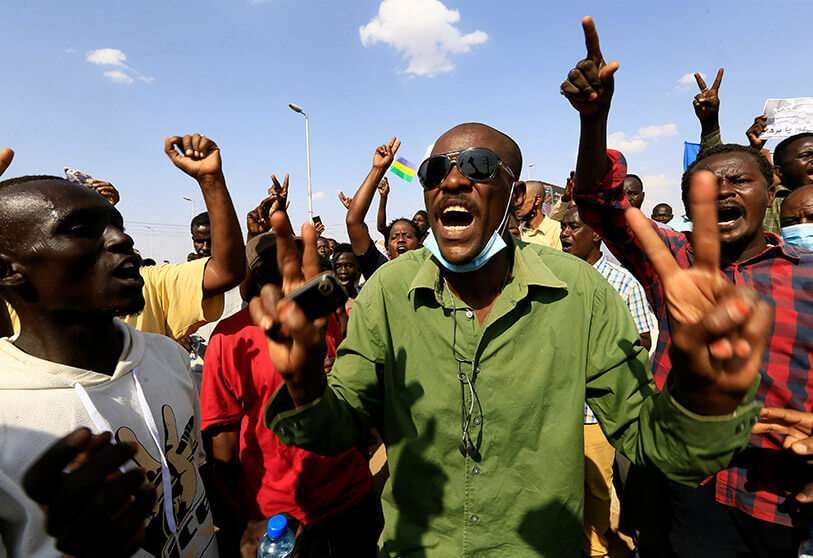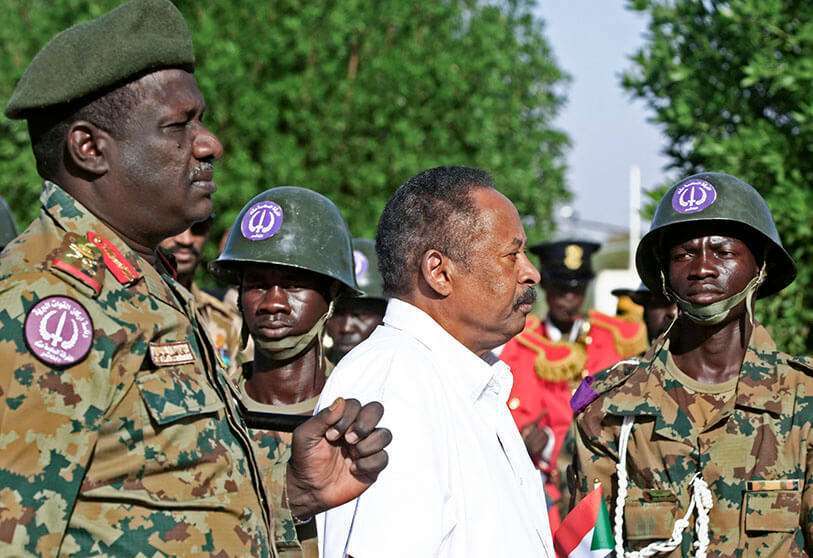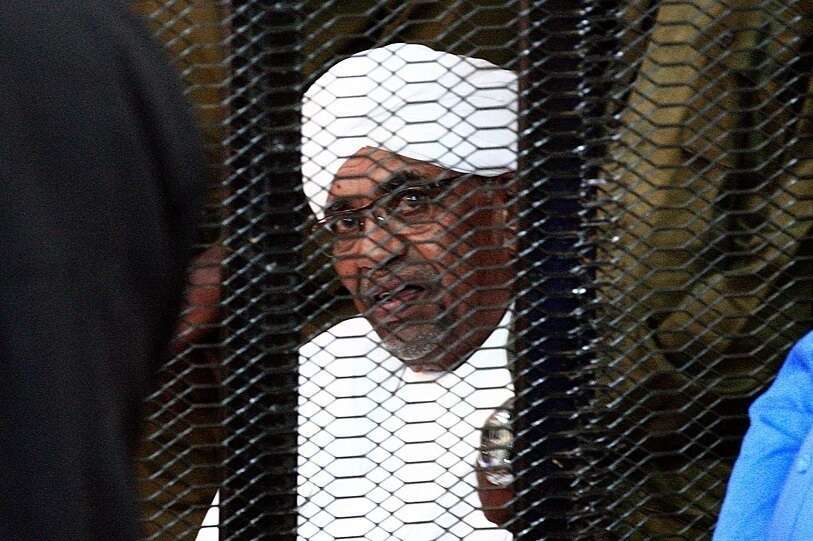Joint military forces stage coup in Sudan and kidnap prime minister

The thread holding together the situation in Sudan has finally given way. The tension between the two sectors of the government has not withstood the pressure of a sector of the population that has been calling for the reestablishment of an exclusively military government. Less than a week ago, the rallies of both those advocating a democratic transition and those preferring the military route had reached a point that brought Sudan to the brink of explosion. The coup d'état perpetrated by the military wing of the government puts an end to the democratic aspirations that led to the ouster of dictator Omar al-Bashir.
"The civilian members of the Sovereign Transitional Council and several ministers of the transitional government have been arrested by joint military forces". This is how the Ministry of Information announced in an official statement shared on its Facebook account the arrest of the civilian wing and the materialisation of a coup d'état that had already been attempted at the end of last month. On this occasion, the joint military forces managed to seize control and even kidnapped the prime minister, Abdullah Hamdok, who is currently unaccounted for. However, shortly before his arrest, Hamdok called on the population to "occupy the streets" to "defend the revolution".

The uprising, which has taken away two years of democratic efforts, began with the blocking of access roads to the Sudanese capital, Khartoum. In addition, according to the Al-Arabiya television channel, the capital's airport suspended all international flights, although the government did not report this. Unlike the coup attempt at the end of last month, there has been no response from forces loyal to the regime, if there is still a sector loyal to the democratic will.
The Sudanese Ministry of Information also reported in its communiqué that 'following his refusal to support the coup, an army unit arrested the prime minister and took him to an unknown location', confirming the abduction of the hitherto head of the Sudanese government. However, Abdullah Hamodk was under house arrest while the military pressured him to sign a communiqué in favour of the coup, which he refused to support, and which led to his arrest to the concern of the international community.

The coup, also confirmed by the spokesman for the prime minister's office, Adam Herika, comes at a moment that seemed to be a key moment for the future of Sudan. In fact, Jeffrey Feltman, the US special envoy for the Horn of Africa, met last weekend with civilian and military representatives of the Sudanese government to discuss, among other issues, the democratic transition they have been working on for the past two years. This meeting not only failed to calm the situation of instability that the country had been experiencing for weeks, but preceded a coup which, according to observers, was only a matter of time given the tension that had built up between the two sides of the executive.

Feltman has been quick to speak out on social media. The US envoy said that his country "is deeply alarmed by reports of a military takeover of the transitional government", and that "this would contravene the Constitutional Declaration (which describes the transition) and the democratic aspirations of the Sudanese people", he said on his Twitter account. The Sudanese Professionals Association, Sudan's main pro-democracy political group, also reacted to the coup by calling, as did the prime minister before he was abducted, for people to take to the streets to challenge the military wing of the government's seizure of power by force.
Phone and internet outages across the country have made it even more complicated to follow what is happening in Sudan, which is experiencing its most complicated days since the formation of the interim government in August 2019. Last Thursday there were already tense moments in the massive demonstration in Khartoum in favour of the democratic process that brought together tens of thousands of Sudanese who, contrary to what seems to have happened to a minority sector of the population, have not forgotten the spirit that led to the end of 30 years of dictatorship. These rallies were also triggered by the worrying economic crisis in a country with a 400% inflation rate.

The coup attempt a month ago put the civilian leadership of the government on notice. Prime Minister Hamdok even stated that it was necessary to "reform the military and security organs". At the time, a section of dictator Omar al-Bashir's loyalists were blamed for organising the revolution that was foiled when they tried to take over the offices of the national radio station in Omdurman, a town adjacent to the capital. It was also believed that some of those who took part in the operation to overthrow the executive were part of the Muslim Brotherhood, an organisation considered terrorist by the United States and the European Union, among others, and which has been linked on multiple occasions with the Turkish government.

Sudan is facing a moment of maximum complexity in what should be a preparatory stage towards democracy. Elections, originally scheduled for August 2023, now seem an impossibility, while the rest of the world awaits developments. The European Union and the United Nations have expressed their concern about the coup and have called for the immediate release of those belonging to the civilian wing of the government. Josep Borrell, the EU's High Representative for Foreign Affairs and Security Policy, has called on "all stakeholders and regional partners to put the transition process back on track".
The US warned weeks ago that sanctions imposed on Sudan during al-Bashir's dictatorship and removed with the coup that led to the interim government would return if power were to be controlled exclusively by the military wing. For the time being, Washington has already announced that, in the event of a failure to return to the process of transition to democracy, it will cut off all aid currently provided to Sudan. Sudan's situation could collapse if it loses one of the factors keeping its impoverished economy afloat. Therefore, the next few hours will largely mark the near future of a state that sees its attempts at democracy thwarted.










